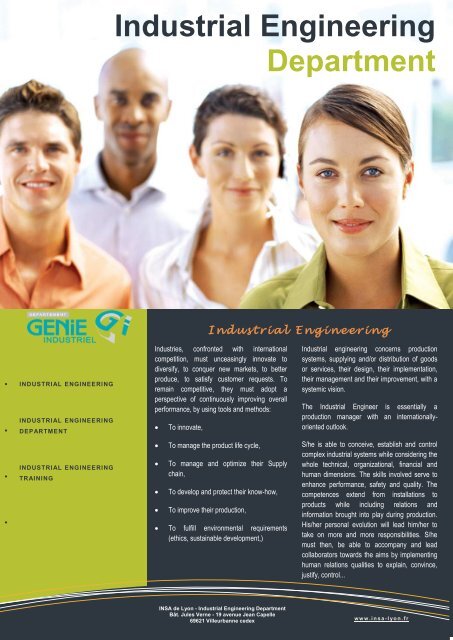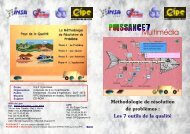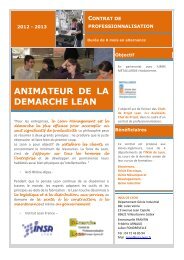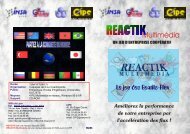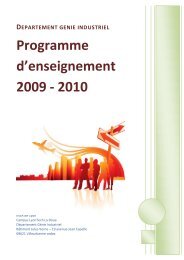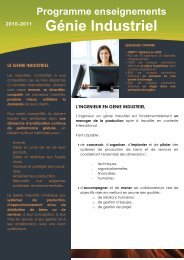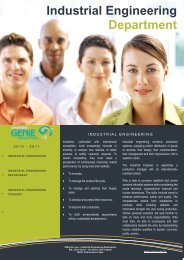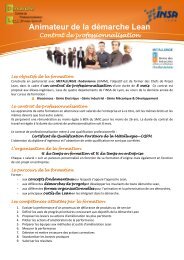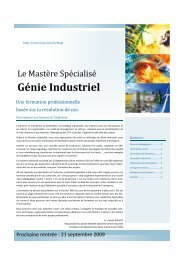Industrial Engineering Department - INSA de Lyon
Industrial Engineering Department - INSA de Lyon
Industrial Engineering Department - INSA de Lyon
You also want an ePaper? Increase the reach of your titles
YUMPU automatically turns print PDFs into web optimized ePapers that Google loves.
<strong>Industrial</strong> <strong>Engineering</strong><br />
<strong>Department</strong><br />
I n d u s t r i a l E n g i n e e r i n g<br />
INDUSTRIAL ENGINEERING<br />
INDUSTRIAL ENGINEERING<br />
DEPARTMENT<br />
INDUSTRIAL ENGINEERING<br />
TRAINING<br />
Industries, confronted with international<br />
competition, must unceasingly innovate to<br />
diversify, to conquer new markets, to better<br />
produce, to satisfy customer requests. To<br />
remain competitive, they must adopt a<br />
perspective of continuously improving overall<br />
performance, by using tools and methods:<br />
<br />
<br />
<br />
<br />
<br />
To innovate,<br />
To manage the product life cycle,<br />
To manage and optimize their Supply<br />
chain,<br />
To <strong>de</strong>velop and protect their know-how,<br />
To improve their production,<br />
To fulfill environmental requirements<br />
(ethics, sustainable <strong>de</strong>velopment,)<br />
<strong>Industrial</strong> engineering concerns production<br />
systems, supplying and/or distribution of goods<br />
or services, their <strong>de</strong>sign, their implementation,<br />
their management and their improvement, with a<br />
systemic vision.<br />
The <strong>Industrial</strong> Engineer is essentially a<br />
production manager with an internationallyoriented<br />
outlook.<br />
S/he is able to conceive, establish and control<br />
complex industrial systems while consi<strong>de</strong>ring the<br />
whole technical, organizational, financial and<br />
human dimensions. The skills involved serve to<br />
enhance performance, safety and quality. The<br />
competences extend from installations to<br />
products while including relations and<br />
information brought into play during production.<br />
His/her personal evolution will lead him/her to<br />
take on more and more responsibilities. S/he<br />
must then, be able to accompany and lead<br />
collaborators towards the aims by implementing<br />
human relations qualities to explain, convince,<br />
justify, control...<br />
<strong>INSA</strong> <strong>de</strong> <strong>Lyon</strong> - <strong>Industrial</strong> <strong>Engineering</strong> <strong>Department</strong><br />
Bât. Jules Verne - 19 avenue Jean Capelle<br />
69621 Villeurbanne ce<strong>de</strong>x<br />
w w w . i n s a - l yo n . f r
<strong>Industrial</strong> <strong>Engineering</strong><br />
<strong>Industrial</strong> engineering concerns production systems, supplying and/or<br />
distribution of goods or services, their <strong>de</strong>sign, their implementation, their<br />
management and their improvement, with a systemic vision.<br />
The <strong>Industrial</strong> Engineer is essentially a production manager with an<br />
internationally-oriented outlook.<br />
S/he is able to conceive, establish and control complex industrial systems<br />
while consi<strong>de</strong>ring the whole technical, organizational, financial and human<br />
dimensions. The skills involved serve to enhance performance, safety and<br />
quality. The competences extend from installations to products while including<br />
relations and information brought into play during production. His/her personal<br />
evolution will lead him/her to take on more and more responsibilities. S/he<br />
must then, be able to accompany and lead collaborators towards the aims by<br />
implementing human relations qualities to explain, convince, justify, control...<br />
Main employment fields<br />
The <strong>Industrial</strong> Engineer’s competences and knowledge of the different tools<br />
and methods of optimization are sought by any type of structure and any<br />
branch of industry:<br />
Data processing equipment and electronics,<br />
Automobile industry, aeronautics, transport,<br />
Food industry,<br />
Pharmaceutical, cosmetic, metallurgical and energy industries,<br />
Services, engineering and technical studies,<br />
…<br />
The constant research for overall improvement of corporate performance leads<br />
the <strong>Industrial</strong> Engineer to have a transversal approach to the company<br />
including flows (goods, information, financial data,) and processes in their<br />
entirety. As a Project Lea<strong>de</strong>r, the <strong>Industrial</strong> Engineer has to exert functions in<br />
various fields such as:<br />
INDUSTRIAL<br />
ENGINEERING<br />
Industries, confronted with<br />
international competition,<br />
must unceasingly innovate to<br />
diversify, to conquer new<br />
markets, to better produce, to<br />
satisfy customer requests. To<br />
remain competitive, they must<br />
adopt a perspective of<br />
continuously improving overall<br />
performance, by using tools<br />
and methods:<br />
To innovate,<br />
To manage the product life<br />
cycle,<br />
To manage and optimize their<br />
Supply chain,<br />
To <strong>de</strong>velop and protect their<br />
know-how,<br />
To improve their production,<br />
To fulfill environmental<br />
requirements<br />
<br />
<br />
<br />
<br />
<br />
<br />
<br />
Management, Lea<strong>de</strong>rship,<br />
Research and Development,<br />
<strong>Engineering</strong>, Studies and technical advice,<br />
Project or program management,<br />
Production, exploitation, maintenance, tests, quality, safety,<br />
Information systems<br />
…
<strong>Industrial</strong> <strong>Engineering</strong> <strong>de</strong>partment<br />
The 1000th graduate<br />
has been celebrated<br />
in 2009<br />
INTERNATIONAL OUTLOOK<br />
Minimum score in English<br />
equivalent to 800 at TOEIC<br />
Possibility to prepare double<br />
diplomas with UPC Barcelona<br />
and the University of Santa<br />
Catarina (Brazil)….<br />
Stay in an English speaking<br />
country for all stu<strong>de</strong>nts (3rd<br />
year)<br />
Possibility of six to twelve<br />
months’ exchange within a<br />
foreign university<br />
Possibility of internship within<br />
a foreign company<br />
A large number of foreign<br />
stu<strong>de</strong>nts are being integrated<br />
each year in an exchange<br />
program<br />
From its creation in 1992, the <strong>Industrial</strong> <strong>Engineering</strong> <strong>Department</strong> has<br />
formalized a strong partnership with its professional environment. These<br />
partners take an active part in the evolution of the <strong>de</strong>partment by i<strong>de</strong>ntifying<br />
the problems and emerging themes in their respective fields.<br />
Each year more than 75 stu<strong>de</strong>nts receive a <strong>de</strong>gree after having<br />
completed 3 years’ studies in the <strong>de</strong>partment.<br />
The stu<strong>de</strong>nts come either from the bachelors’ level at <strong>INSA</strong> or from<br />
preparatory classes in prestigious third-level institutions, university institutes<br />
of technology and university scientific programs that award a diploma after<br />
two years of studies.<br />
Thanks to a solid methodological and technical foundation, stu<strong>de</strong>nts<br />
<strong>de</strong>velop an array of fully exploitable skills that respond to employers’<br />
<strong>de</strong>mands. With a generalist approach to training, the <strong>de</strong>partment<br />
facilitates their entry into professional life and the best career<br />
advancement possible, in France and abroad.<br />
<strong>Industrial</strong> engineers trained by the <strong>de</strong>partment are able to practice a variety of<br />
careers in virtually all economic sectors. The training prepares them for this<br />
as it <strong>de</strong>velops the necessary competences, allied with strong relational skills.<br />
The <strong>de</strong>partment aims to make its aspiring engineers aware of the context in<br />
which they will intervene. The diversity of professional sectors and the<br />
globalization of the economy lead us to consi<strong>de</strong>r and draw from experiences<br />
gained in companies and in foreign countries as priority goals.<br />
Presenting real originality in teaching, the <strong>Department</strong> of <strong>Industrial</strong><br />
<strong>Engineering</strong> is resolutely turned towards project culture and the industrial<br />
world.<br />
Participation in the stu<strong>de</strong>nts’<br />
association ESTIEM<br />
(European Stu<strong>de</strong>nts of<br />
<strong>Industrial</strong> <strong>Engineering</strong> and<br />
Management)<br />
Study of a 2nd and 3rd<br />
language: Spanish, German<br />
or Chinese
The foundation course – Basic training<br />
The role of the two-year "First Cycle" is to change freshly integrated<br />
secondary education stu<strong>de</strong>nts into future <strong>INSA</strong> Engineers. The "First Cycle"<br />
provi<strong>de</strong>s the basic core tuition required in science, technology and<br />
humanities, in or<strong>de</strong>r to follow the specialization programs of engineering<br />
training<br />
The second cycle - Specialization<br />
The second cycle covers three years and aims at training innovating and<br />
enterprising engineers. <strong>INSA</strong> engineers are trained to operate within complex<br />
environments and in complex situations. They are open to the world,<br />
responsible, autonomous and communicate effectively.<br />
PhD<br />
After their engineering <strong>de</strong>gree, stu<strong>de</strong>nts may choose to further their studies<br />
by entering a 3 year training and research course leading to a Doctoral<br />
Thesis. This course is un<strong>de</strong>rtaken within a recognized research team and<br />
un<strong>de</strong>r the direction of a research-professor or researcher qualified to direct<br />
doctoral theses.<br />
The Advanced Masters (AM) is a post <strong>de</strong>gree course that covers at least two<br />
semesters and inclu<strong>de</strong>s theoretical courses, personal research work<br />
conducted in a company and presentation of a professional thesis.<br />
Lifelong training<br />
<strong>INSA</strong> <strong>Lyon</strong> offers a wi<strong>de</strong> range of training programs in the scientific and<br />
technical areas. Also transversal training programs addressing themes such<br />
as management, project management and quality are offered.<br />
GI AND RESEARCH<br />
4 laboratories:<br />
Decision and Information<br />
Sciences for Production Systems<br />
(DISP)<br />
Electrical, Automation, Genomics<br />
and Environmental Microbiology<br />
<strong>Engineering</strong> Lab<br />
Contact Mechanics and<br />
Structures Lab<br />
Laboratory of Images and<br />
Information Systems Information<br />
Technology<br />
Masters of Science<br />
Informatics and Applications<br />
Information Sciences, Devices<br />
and Systems in Electro-technical<br />
and Automation<br />
AWARDING THE DIPLOMA<br />
To obtain the diploma in<br />
<strong>Industrial</strong> <strong>Engineering</strong>, the<br />
stu<strong>de</strong>nt must have completed by<br />
the end of the 5 th year:<br />
<strong>Industrial</strong> internship (18 weeks)<br />
during the 4 th year, validated by a<br />
report and an oral presentation.<br />
Each study unit and final project<br />
assignment presented before a<br />
jury.<br />
An equivalent score of 800 on the<br />
TOEIC test obtained during the 3<br />
years at IE.<br />
A qualification of at least level 1<br />
in another foreign language<br />
(other than English).<br />
The validation of a non-scientific<br />
research project in Humanities
1st year in GI : The Approach<br />
BASIC TRAINING OF THE<br />
ENGINEER<br />
Computer sciences<br />
Mechanics<br />
Automatic control & systems<br />
Mathematics and physics<br />
Languages<br />
SPECIFIC TRAINING<br />
Management<br />
Financial management<br />
Human resources management<br />
Marketing, strategy<br />
Decision-making, Optimization<br />
Planning, Scheduling<br />
Design of production systems<br />
and logistic chains<br />
Information systems, ERP, APS<br />
Automation, Technical data<br />
management,<br />
Knowledge management<br />
Project management<br />
Product Life cycle Management<br />
PROFESSIONAL TOOLS<br />
Acquisition of the technical and methodological bases, discovery of corporate<br />
organizations.<br />
Visits of industrial sites<br />
A stay in an English speaking country for language practice<br />
2nd year in GI : The Integration<br />
Improvement and appropriation of the methods in industrial management<br />
sciences<br />
A seven month group project of (ten stu<strong>de</strong>nts per group), which allows the<br />
stu<strong>de</strong>nts to <strong>de</strong>velop products for IE’s industrial partners. In this framework,<br />
they gain experience in project management and customer relationship<br />
management.<br />
Immersion in a company through long-term industrial internship (minimum 18<br />
weeks). For the stu<strong>de</strong>nt, this is first-hand experience in the situation of an<br />
engineer. This internship gives practical meaning to the concepts and mo<strong>de</strong>ls<br />
discovered in his/her aca<strong>de</strong>mic education. It provi<strong>de</strong>s the opportunity to get in<br />
touch with industrial culture.<br />
3rd year in GI : The Control<br />
Feedback on cultural and industrial dimensions of the internships<br />
Achievement of real business projects by industrial speakers (logistics,<br />
quality, Am<strong>de</strong>c, re-engineering, company creation)<br />
Final project assignment – “PFE” (minimum 18 weeks): a mission in an<br />
industrial environment with full support of the <strong>Department</strong>’s resources<br />
(materials, documentation and human resources)<br />
Flow simulation (ARENA)<br />
ERP (SAP/R3)<br />
Manufacturing Execution System<br />
(MES)<br />
Scheduling (Incoplan)<br />
Process mo<strong>de</strong>ling (ARIS)<br />
Project management (MS<br />
Project)<br />
Product <strong>de</strong>sign (Solid Edge)<br />
Pro Engineer<br />
Minimaint
The 1st year in IE aims to teach the basic and essential concepts inherent to an industrial engineer’s culture and knowledge.<br />
The stu<strong>de</strong>nt thus acquires fundamental knowledge in process control, computer science, mechanics, communication and business<br />
management.<br />
This teaching, with a broad spectrum, prepares the future engineer for communicating with specialists in various fields and in a<br />
project-oriented situation. In<strong>de</strong>ed, projects constitute an important part of the teaching program from the second half of the year<br />
onwards. Training in communication is acquired by practicing within the framework of a theatre project. Extending cultural and<br />
linguistic knowledge is a priority assured through intensive English training and a 2 to 3 month immersion stay in an English<br />
speaking country.<br />
Practical exercises and projects count for 40% of the scientific workload. Business games and interactive software will be used<br />
within all teaching in IE.<br />
6 training fields: Automatic control & systems— Data base— Mo<strong>de</strong>ls, signals & systems—Materials & manufacturing processes—<br />
Mechanics—Management & social sciences<br />
During the 2nd year, the stu<strong>de</strong>nt learns to master the tools which s/he was familiarized with during the 1st year. S/he<br />
also discovers new techniques centered on production management, computer science and management methods to be put to use<br />
in a transversal approach to the company.<br />
Internship<br />
Classes finish in April and are followed by an internship within a company for 18 weeks. The 2nd year is primordial in the education<br />
of an industrial engineer. Mainly organized in project-oriented work in or<strong>de</strong>r to reach and reinforce know-how and better business<br />
knowledge.<br />
Teaching is divi<strong>de</strong>d into 5 fields: Computer science—Production management—Decision & diagnosis support—Management &<br />
Social sciences—Project management<br />
After 5 months of industrial internship, the stu<strong>de</strong>nts have a better knowledge of the industrial environment, have more confi<strong>de</strong>nce in<br />
their competence and have a more accurate i<strong>de</strong>a of their professional objectives.<br />
<strong>Industrial</strong> internship (4IE)<br />
This constitutes the first experience as an engineer. It gives a practical meaning to the concepts and mo<strong>de</strong>ls studied during the<br />
training. It provi<strong>de</strong>s the opportunity to work with industrialists, and to make first <strong>de</strong>cisions in the industrial world.<br />
Team project (4IE)<br />
Each project is conducted by a group of 8 to 10 stu<strong>de</strong>nts using all the technical resources of the <strong>de</strong>partment and its management.<br />
Over 6 months, the project corresponds to an investment of about 3000 hours per team. The main pedagogical objectives are:<br />
- To learn how to conduct a project: to study a market, to<br />
analyze terms and conditions, to negotiate, to manage<br />
resources, to plan, to specify prototypes, to control<br />
quality....and to <strong>de</strong>fend the project in front of a jury,<br />
- To learn how to conduct a real project as a team: group<br />
organization, communication, and coordination. This<br />
training is gui<strong>de</strong>d by sociologists playing the part of<br />
group regulators (1 per group of 8 stu<strong>de</strong>nts),<br />
- To learn how to collect, extract, structure and formalize<br />
knowledge on computer-integrated manufacturing,<br />
- To <strong>de</strong>velop creativity,<br />
- To approach a manufacturing company from all aspects<br />
(history, range, organization, strategy, implementation,<br />
process, branches),<br />
- To reinforce the partnership between IE and its<br />
industrial partners by studying and producing products<br />
corresponding to real needs expressed by the industrial<br />
world,<br />
- To control and to <strong>de</strong>velop the use of new technologies,<br />
to <strong>de</strong>sign products (applied domain) in a training or<br />
communication context.<br />
- The team project is validated by two oral presentations:<br />
the first one relates to terms and conditions and takes<br />
place in January and the second one, at the end of the<br />
project. This last presentation is prece<strong>de</strong>d by the client’s<br />
reception of the final product.
The 3rd year aims at synthesizing the teaching of the 1st and 2nd years in IE (the industrial projects) and at extending<br />
some of the knowledge (final project assignment, information retrieval) by multiplying contacts with industrialists. Some courses<br />
provi<strong>de</strong> additional training or <strong>de</strong>velop an expertise on certain fundamental points of the industrial world. This last year also provi<strong>de</strong>s<br />
the stu<strong>de</strong>nt with, the opportunity to present his personal project in humanities and to acquire knowledge in a second foreign<br />
language (German, Spanish or Chinese), an essential aspect of the international vocation of industrial engineer.<br />
<strong>Industrial</strong> projects (5IE)<br />
The industrial project is a real corporate project. It is the 3rd year’s masterpiece. Each project (each stu<strong>de</strong>nt will <strong>de</strong>al with three of<br />
them) is supervised and led by industrial project lea<strong>de</strong>rs over 6 weeks. The stu<strong>de</strong>nts are working out a solution in response to a set<br />
of conditions. Each group, as the lea<strong>de</strong>r of the project (i.e., 6 stu<strong>de</strong>nts), proposes and <strong>de</strong>fends its technical, organizational,<br />
economic and temporal solutions. Each group is competing to win the market. The <strong>de</strong>bate on the i<strong>de</strong>as proposed during these<br />
projects is generally beneficial for the industrialists.<br />
Final Project Assignment (5IE)<br />
For 18 consecutive weeks (minimum), the PFE aims to solve an industrial problem within an enterprise.<br />
The project provi<strong>de</strong>s a mission similar to that of an engineer. In a general manner, it is question of adopting project management<br />
behavior: product analysis and <strong>de</strong>sign phases, implementation of the manufacturing process, production system organization .<br />
A bibliographical research project is associated with the final project assignment. It aims to broa<strong>de</strong>n the stu<strong>de</strong>nt’s knowledge of the<br />
subject studied using international databases, and the ability to collect documents and synthesize the results.<br />
10 to 15% of the Final Project Assignment is carried out abroad<br />
Personal project in humanities<br />
As in the other <strong>de</strong>partments of <strong>INSA</strong>, each stu<strong>de</strong>nt has to present a PPH. It results from a personal reflection or achievement of a<br />
non-scientific project (social life, culture, sports.)
3 rd YEAR<br />
E3 ECC GI3 ECC 55 Chain of or<strong>de</strong>r environment<br />
Coef Coef Hrs ECTS<br />
50 44 2,5<br />
T8 T8 GI3 API 55 Programmable logic control 9 8 1<br />
E4 ARP GI3 ARP 55 Control, regulation, PID 22 20 1,5<br />
P1 P1 GI3 P/CSR 55 Control of a robotized system 27 24 1,5<br />
T2 T2 GI3 TP/PID 55 Process control – PID 18 16 1<br />
E2 SIM GI3 SIM 55 Simulation of system with discrete events 231 18 16 1<br />
T9 T9 GI3 TP/MATLAB 55 Simulation MATLAB 9 8 0,5<br />
T1 T1 GI3 TP/ARENA 55 Simulation SED ARENA 13 12 1<br />
E14 RDP GI3 RDP 55 Petri nets 29 26 1,5<br />
E12 THG GI3 THG 55 Graphs theory 20 18 1,5<br />
E15 PST GI3 PST 55 Stochastic processes 16 14 1<br />
E6 BDI GI3 BDI 65 Data processing bases<br />
34 30 2<br />
T3 T3 GI3 TP/ALGO 65 Algorithmy 23 20 1,5<br />
E7 UML GI3 UML 65 UML 18 16 1<br />
T4 T4 GI3 TP/OBJET 65 Objects 18 16 1<br />
E5 ARO GI3 ARO 65 Computer architecture 163 18 16 1<br />
T19 T19 GI3 TP/ARO 65 Multi-tasking 9 8 0,5<br />
E8 BDD GI3 BDD 65 Data base 20 18 1,5<br />
T6 T6 GI3 TP/XML 65 XML 9 8 0,5<br />
T5 T5 GI3 TP/SQL 65 SQL 14 12 1<br />
E13 MAC GI3 MAC 55 Design methodologies<br />
22 20 1,5<br />
T20 T20 GI3 TP/ASY 55 Systems analysis 9 8 0,5<br />
T22 T22 GI3 TP/REAKTIK 55 Reaktik 9 8 0,5<br />
P2 P2 GI3 P/CSI 65 Design of an information system 27 24 1,5<br />
164<br />
E1 ACS GI3 ACS 77 Conceptual approach of systems 42 38 2,5<br />
T7 T7 GI3 TP/ACS 77 Mo<strong>de</strong>lling of systems 9 8 0,5<br />
E11 PRS GI3 PRS 61 Probabilities - Statistics 32 28 1,5<br />
T16 T16 GI3 TP/PRS 66 Probabilities - Statistics 14 12 1<br />
E17 CNU GI3 CNU 51 Numerical control<br />
11 10 1<br />
T10 T10 GI3 TP/CNU 51 Numerical control 13 8 0,5<br />
77<br />
P3 P3 GI3 P/PEX 51 Experimental <strong>de</strong>sign 13 12 0,5<br />
P4 ANF GI3 P/ANF 51 Manufacturing analysis 40 32 2 2<br />
E16 MAT GI3 MAT 43 Mechanical properties of materials<br />
30 28 1,5<br />
T12 T12 GI3 TP/MAT 43 Selection of materials, characterisation tests 18 16 1,5<br />
E19 RDM GI3 RDM 43 Strength of materials 40 32 2 2<br />
E20 CSM GI3 CSM 51 Design and fiability of mechanical systems 176 30 28 1,5<br />
P5 CMP GI3 P/CMP 51 Production machines <strong>de</strong>sign 40 32 2<br />
T14 T14 GI3 TP/ASM 51 Mechanical systems analysis 9 8 1<br />
T21 T21 GI3 TP/FIAB 51 Fiability 9 8 1<br />
E21 DFI GI3 DFI 11 The company, financial diagnostic<br />
29 24 1<br />
42<br />
T15 T15 GI3 TP/PUI7 11 Methodology of problem resolution 13 12 1<br />
E22 E22 GI3 COMM Communication practice<br />
32 30 2<br />
E23 E23 GI3 ANGLAIS 1st language practice (English) 114 32 30 4<br />
E24 E24 GI3 SPORT Sport activities 50 45 2<br />
3,5<br />
4<br />
2,5<br />
4<br />
3,5<br />
2<br />
1,5<br />
3<br />
4<br />
3<br />
2,5<br />
2<br />
3<br />
5,5<br />
14<br />
10<br />
9,5<br />
4<br />
10,5<br />
2 2<br />
8 8<br />
GI3 BIBLIO 77 bibliographic research 33 33 2 2 2 2<br />
1000 1000 853 60 60 60
4 TH YEAR<br />
Coef Hrs ECTS<br />
E8 AND GI4 AND 65 Data analysis 154 27 20 1,5<br />
E16 EDD GI4 EDD 65 Data warehouse 19 14 1,5 4,5<br />
P2 P2 GI4 P/EDD 65 Data warehouse Project 27 20 1,5<br />
9,5<br />
E18 RES GI4 RES 65 Networks 18 10 1<br />
3<br />
P1 P1 GI4 P/RI Networks project 33 24 2<br />
E3 IHM GI4 IHM 65 Human-computer interaction 30 22 2 2<br />
E5 GP1 GI4 GP1 55 Production management : basics<br />
30 22 2<br />
E6 GP2 GI4 GP2 65 Production management : complements 25 18 1<br />
3<br />
P6 P6 GI4 CSP 55 Design of production systems 179 43 32 1,5 1,5 8,5<br />
P4 P4 GI4 P/OGF 55 Scheduling and flow management 38 28 2 2<br />
P5 P5 GI4 ERP 55 ERP – production management and planning project 43 32 2 2<br />
E4 MES GI4 MES 55 MES<br />
16 12 1<br />
E1 AUT GI4 AUT 55 Automation 16 12 1<br />
2<br />
P3 P3 GI4 P/MES 55 MES project 43 32 1,5<br />
3<br />
P8 P8 GI4 P/AUT 55 Automation project 166 22 16 1,5 8<br />
E7 DMO GI4 DMO 77 Decision support 22 16 1<br />
E10 SDF GI4 SDF 77 Reliability 22 16 1 3<br />
E12 QMA GI4 QMA 77 Quality – Maintenance 25 18 1<br />
E14 BCG GI4 BCG 11 Budget and Control management<br />
27 22 1<br />
49<br />
E15 ASO GI4 ASO 11 Sociological analysis of the organizations 22 16 1<br />
2 2<br />
E11 GEP GI4 MPC 77 Project management<br />
17 6 1<br />
12<br />
P7 P7 GI4 P/PCO 77 Collective project management 322 105 80 11 28<br />
GI4 SINDUS 77 <strong>Industrial</strong> internship 200 16 16<br />
T GI4 ANGLAIS TOEIC<br />
27 20 0<br />
T2 T2 GI4 LV2 2nd language 130 54 40 2 4 4<br />
T3 T3 GI4 SPORT Sport 49 36 2<br />
1000 1000 584 60 60 60
5 TH YEAR<br />
E1 MRH GI5 MDRH 11 Management of human resources<br />
Coef Hrs ECTS<br />
38 24 2 2<br />
E2 RSE GI5 RSE 11 Corporate social responsibility 31 18 2 2<br />
DED GI5 DED 11 Sustainable Development 15 8 0,5 0,5<br />
E14 KM GI5 KM 11 Knowledge management 32 20 2 2<br />
E4 SVE GI5 SVE 11 Strategy and economical monitoring 138 22 12 1 1<br />
Supply chain and implementation of production<br />
E8 LOG GI5 LOG 55<br />
systems<br />
44 28 2,5 3,5<br />
E11 ACH GI5 ACHAT 55 Purchasing 28 16 1<br />
E15 ERG GI5 ERGO 55 Ergonomy 28 16 1,5<br />
E3 LEA GI5 LEAN 55 Lean 30 18 1,5<br />
E9 SUP GI5 SUP 55 Control - Supervision 28 16 1,5<br />
E13 GMA GI5 GMAO 55 Maintenance assisted by computer 34 22 2<br />
E6 OPA GI5 OPA 55 Advanced planning 34 22 2<br />
E10 PRH GI5 PRH 55 Human resources requirement planning 250 24 14 1<br />
GI5 PFE 77 Final Project Assignment 400 400 30 30 30<br />
GI5 PROINDUS 77<br />
GI5 SPORT<br />
<strong>Industrial</strong> project 1<br />
40 24 2<br />
<strong>Industrial</strong> project 2 40 24 2<br />
<strong>Industrial</strong> project 3 134 54 32 3<br />
Sport<br />
34 21 1<br />
GI5 LV2 Language 78 44 28 1,5<br />
3<br />
3,5<br />
3<br />
7,5<br />
13<br />
7 7<br />
2,5 2,5<br />
1000 1000 363 60 60 60
3 RD YEAR<br />
AUTOMATIC CONTROL AND SYSTEMS<br />
E3 – ENVIRONMENT, COMMAND CHAINS AND REALIZATION -<br />
Hydraulics, actuators, modulators<br />
Measuring chains<br />
Electric actuators<br />
Real case study – choice of actuators and sensors (guiding<br />
principles)<br />
T8 - PROGRAMMABLE LOGIC CONTROLER<br />
Or<strong>de</strong>rs of a rotary store by Grafcet<br />
Control of a system of congestion<br />
E4 - CONTROL, REGULATION and PID<br />
Signal processing, filtering<br />
Feed-back, feed-forward<br />
Frequency analysis<br />
Stability, precision<br />
Control, Regulation PID<br />
Controlled systems, correction by PID<br />
T2 – PROCESS CONTROL: PID<br />
Implementation of a real control system:<br />
Control of position and speed<br />
Temperature control<br />
Level regulation<br />
Vertical store programming<br />
P1 – CONTROL OF A ROBOTIZED SYSTEM<br />
Environment, sensors and information acquisition<br />
Transmission and effectors<br />
Or<strong>de</strong>ring algorithms<br />
Global system behavior<br />
E2 - SIMULATION OF SYSTEMS WITH DISCRETE EVENTS<br />
Typology of production systems<br />
Recall of probabilities and statistics<br />
Mo<strong>de</strong>ling approaches for simulation<br />
Analysis and validation of mo<strong>de</strong>ls<br />
Result analysis of and <strong>de</strong>cision support systems<br />
Mo<strong>de</strong>ling, analysis and evaluation of the performances of systems<br />
with discrete events, in particular production systems<br />
T1 – SIMULATION SED ARENA<br />
Introduction to simulation software and calculation usually used in<br />
companies.<br />
T9 SIMULATION OF CONTINUOUS SYSTEMS WITH MATLAB<br />
E12 - GRAPH THEORY<br />
Various representations of a graph<br />
Connectivity, strong components<br />
Shortest path<br />
Maximal matching, Maximum flow, Minimal spanning tree<br />
Introduction to mo<strong>de</strong>ling and optimization.<br />
E14 –PETRI NETS –<br />
This course aims to give the stu<strong>de</strong>nts, specialized in production systems, the<br />
tools and the methodologies of analysis and dimensioning. The studied<br />
systems are characteristic of systems whose states belong to a discrete<br />
space. Transitions from states are only observed at discrete moments of time,<br />
therefore they are called Systems with Discrete Events.<br />
The mo<strong>de</strong>ling tools used in this course are Petri nets whose structure (static<br />
mo<strong>de</strong>l) induces interesting properties, which allow validating the mo<strong>de</strong>l but<br />
also the studied system. By associating a <strong>de</strong>terministic temporal<br />
characteristic, this mo<strong>de</strong>l shows that it is possible to express performances<br />
quantitatively. Beyond the discovery of a mo<strong>de</strong>ling tool, this course teaches<br />
knowledge on the engineering environment and on system <strong>de</strong>sign and its<br />
terminology.<br />
E15 – STOCHASTIC PROCESSES<br />
This course aims to give the stu<strong>de</strong>nts, specialized in production systems, the<br />
tools and the methodologies for the analysis of stochastic systems. The<br />
studied systems concern systems with Discrete Events for which the<br />
transition moments are not <strong>de</strong>terministic any more but <strong>de</strong>pend on random<br />
phenomena. The mo<strong>de</strong>ling tools used in this course are Markov processes<br />
and queue networks. By expressing the equilibrium equations of these<br />
mo<strong>de</strong>ls it is possible to characterize the load indicator, which is very<br />
interesting for the evaluation of productivity but also of reliability<br />
COMPUTER SCIENCES<br />
E6 – DATA PROCESSING BASES<br />
Introduction (concepts of programming methods, programming<br />
languages, software quality)<br />
Objects and elementary actions<br />
Control structures, Procedures and functions<br />
Iterative Structures<br />
Classes and objects<br />
Polymorphism, sending of message<br />
The reasoning<br />
Knowledge mo<strong>de</strong>ling<br />
Structure of knowledge based system<br />
T3 – ALGORITHMS<br />
Design and <strong>de</strong>velopment of applications in the Java language un<strong>de</strong>r LINUX<br />
respecting the principal concepts seen in the course “Algorithms”.<br />
E7 – UML<br />
Mo<strong>de</strong>ling, UML diagrams in general<br />
Class diagrams in practice, Activity diagrams<br />
Associated tools<br />
T4 – OBJETCS<br />
Oriented Object <strong>de</strong>sign and application <strong>de</strong>velopment in Java language un<strong>de</strong>r<br />
Linux using mechanisms presented during the class “Object Oriented <strong>de</strong>sign”.<br />
E5 – COMPUTER ARCHITECTURE<br />
Design of a calculating unit<br />
Memory <strong>de</strong>sign<br />
Machine language<br />
Interrupts/Communication<br />
Memory management<br />
Processes<br />
Introduction to UNIX and Linux<br />
Description of the essential components of the architecture of a<br />
computer and its operating system.<br />
T19 – MULTI TASKING<br />
Study of the multi-tasking architecture of Linux<br />
E8 - DATA BASES<br />
What is a Data Base Management System?<br />
Mo<strong>de</strong>l entity –association, Relational Mo<strong>de</strong>l – Standardization<br />
Query language – Introduction to SQL<br />
T5 - SQL<br />
Creation of a database un<strong>de</strong>r Access, starting from a real case. Query using<br />
SQL requests<br />
T6 - XML<br />
Discovery of XML structure and associated technologies
MODELS SIGNALS AND SYSTEMS<br />
E13 - DESIGN AND METHODOLOGIES ANALYSIS<br />
Structured approach:<br />
Activities and data,<br />
Data flow diagrams,<br />
Data dictionaries,<br />
The author-rea<strong>de</strong>r cycle.<br />
Process oriented approaches:<br />
Conceptual mo<strong>de</strong>ls of data activities and processes<br />
Organizational mo<strong>de</strong>ls of data and processing<br />
Analysis and <strong>de</strong>sign of the 3 components of a production system:<br />
operational system, <strong>de</strong>cision system, and information system.<br />
T20 – SYSTEM ANALYSIS<br />
Re-engineering of production systems<br />
T22 – REAKTIK (business game)<br />
P2 – DESIGN OF INFORMATION SYSTEMS<br />
In an industrial framework, we study the <strong>de</strong>sign of various processing mo<strong>de</strong>ls<br />
(conceptual, organizational and operational) and the corresponding data<br />
mo<strong>de</strong>ls. The emphasis is laid on methodological aspects and on project<br />
control by using a suitable software workshop and by elaborating various<br />
scenarios of computerization. One of the characteristics will be the <strong>de</strong>finition<br />
of sub-projects coordinated within each group of stu<strong>de</strong>nts.<br />
E1 - CONCEPTUAL APPROACH OF SYSTEMS<br />
Concept of a system - Theory of operators<br />
Space and temporal behavior of systems<br />
Principles of projection - Application to regression<br />
Mo<strong>de</strong>ls and structures: matrix approach, Dirac, impulse and in<strong>de</strong>x<br />
responses, graphs...<br />
Convolution operators,<br />
Fourier and Laplace operators.<br />
Mo<strong>de</strong>ling, simulation and control of linear and stationary systems<br />
Decomposition of a system into continuous linear stationary<br />
subsystems<br />
Basic concepts of signals: sampling, filtering, spectral analysis...<br />
Basic concepts of the process control: stability, loops, timeconstants,<br />
adaptation, prediction, and modal control...<br />
T7 – SYSTEM MODELING<br />
Structural <strong>de</strong>composition and dynamic mo<strong>de</strong>ling of a production system.<br />
E11 – PROBABILITIES AND STATISTICS<br />
Distributions and probability laws, Random variables and moments<br />
Estimation (maximum likelihood, robust estimation, regression)<br />
Hypothesis tests<br />
T16 – PROBABILITIES AND STATISTICS<br />
Probabilistic mo<strong>de</strong>ling of notation system (hypothesis tests, a<strong>de</strong>quacy tests,<br />
evaluation of probabilities, analysis of a sample, Matlab programming)<br />
MANUFACTURING PROCESSES<br />
E17 – NUMERICAL CONTROL<br />
Structure of machines – ISO Language<br />
Control unit structure<br />
CN sequence chain<br />
T10 - NUMERICAL CONTROL<br />
Operation and implementation of a machine<br />
Simulation of a lathe engine (trajectory tracking)<br />
Simulation of 3D milling (LICN)<br />
P3 – Experimental <strong>de</strong>sign<br />
P4 – MANUFACTURING ANALYSIS -<br />
Manufacturing ranges<br />
Isostatism<br />
Cut parameters<br />
T13 – CUTTING<br />
Lifespan of tools, economic consequences<br />
Influence of cutting conditions on roughness<br />
MECHANIC<br />
E16 – MECHANICAL PROPERTIES OF MATERIALS<br />
This course aims to <strong>de</strong>scribe and explain the principal mechanical properties<br />
of the large material classes as well as to present a method of material<br />
selection for precise applications. The principal <strong>de</strong>veloped topics are:<br />
The microscopic nature of materials<br />
Plastic strain of materials<br />
Fracture of materials<br />
Material selection: method of the performance indices applied to<br />
real cases<br />
Mechanical properties of metals (steel, cast iron, aluminum alloys),<br />
of polymers (thermoplastics, thermosets, elastomers), of<br />
composites and of ceramics<br />
T12 – MATERIAL SELECTION, CHARACTERIZATION TESTS<br />
Composite approach<br />
Characterization of a material by mechanical tests<br />
Material selection<br />
E19 – STRENGTH OF MATERIALS<br />
Constraint mo<strong>de</strong>ling un<strong>de</strong>r simple loads,<br />
Static balance and torque of mechanical actions,<br />
Beam mo<strong>de</strong>l,<br />
Stress tensors and resistance criteria,<br />
Strain tensors<br />
Constitutive laws,<br />
Bending <strong>de</strong>flection<br />
E20 – DESIGN AND FIABILITY OF MECHANICAL SYSTEMS<br />
Introduction to <strong>de</strong>sign and to CAD<br />
Mo<strong>de</strong>ling of mechanical systems (static, dynamic, fatigue...)<br />
Study of bearings<br />
Mo<strong>de</strong>ling of complex mechanisms. Basic elements of mechanical<br />
<strong>de</strong>sign<br />
P5 – MANUFACTURING MACHINES DESIGN<br />
T14 – MECHANICAL SYSTEM ANALYSIS<br />
T21 - FIABILITY<br />
THE MAN AND THE COMPANY<br />
E21 – ENTERPRISE AND FINANCIAL DIAGNOSIS<br />
T15 – POWER 7<br />
Training of the methods for resolving a problem within a company<br />
Quality tools<br />
Methodologies of problem resolution<br />
LINGUISTIC AND SPORT ACTIVITIES<br />
E22 COMMUNICATION PRACTICE<br />
To become aware of the various communication channels<br />
To explore one’s private means and one’s limits and to train oneself to<br />
overcome them<br />
To question one’s own participation in a group<br />
To inclu<strong>de</strong>/un<strong>de</strong>rstand the steps in social sciences<br />
Joint project through theatre<br />
E23 - ENGLISH + intensive week<br />
E24 - SPORTS<br />
BIBLIOGRAPHY
4 TH YEAR<br />
COMPUTER SCIENCES<br />
E8 – DATA ANALYSIS<br />
1. Data<br />
Characteristics: origin, quality, coding<br />
Preparation: restoration, filtering, synchronization, construction of classes<br />
Depen<strong>de</strong>nce: distances, ultra metric, correlation<br />
2. Tools:<br />
Descriptive methods: principal components analysis, correspon<strong>de</strong>nces,<br />
preferences<br />
Explanatory methods: regression, segmentation, canonical analysis,<br />
discriminated analysis<br />
Structural methods: ultra metric and hierarchical classification, dynamic<br />
swarms.<br />
3. Analysis:<br />
Analysis methodologies<br />
Interpretation rules<br />
Case studies<br />
E16 – DATA WAREHOUSE<br />
Management of the technical data of a project,<br />
Charter of <strong>de</strong>velopment and <strong>de</strong>sign process,<br />
Constraints and specifications for the management of the technical<br />
data,<br />
Smarteam as tool of implementation,<br />
Application CATIA-SMARTEAM<br />
P2 – DATA WAREHOUSE<br />
TDR – NETWORKS<br />
E18 - NETWORKS<br />
P1 – INDUSTRIAL NETWORKS<br />
Implementation of industrial local area networks<br />
Interfacing with general networks<br />
Communication within heterogeneous equipment (robot, MOCN…)<br />
E3 – HUMAN-COMPUTER INTERACTION<br />
Portability of graphical applications<br />
Mo<strong>de</strong>ls and methodology of interface <strong>de</strong>sign<br />
Architectures of UI management systems<br />
Interactivity and mo<strong>de</strong>rn interfacing environments<br />
Multi-modal communication<br />
Ergonomics and human dimensions of UID<br />
UID = vector of transfer of knowledge<br />
UID and production<br />
PRODUCTION MANAGEMENT<br />
E5 – PRODUCTION MANAGEMENT: BASICS<br />
Introduction to technical data<br />
Introduction to production management: Notion of thorough flow,<br />
the various levels of <strong>de</strong>cision: PIC, MPS, MRP, scheduling, basic<br />
elements of stock management<br />
Introduction to production management methods (Kanban, Kaisen,<br />
TOC, SMED, TPM, …)<br />
E6 – PRODUCTION MANAGEMENT: COMPLEMENTS<br />
Information systems: from production management to supply chain<br />
management, CAM, ERP (integrated system for company management),<br />
implementation steps of an ERP<br />
Workshop scheduling (single machine, parallel machines, flow shop, job<br />
shop, hybrid organizations), project scheduling (PERT,)<br />
Forecasting methods<br />
T1 - PRELUDE<br />
P6 – DESIGN OF PRODUCTION SYSTEMS<br />
Preliminary analysis<br />
Design of production systems<br />
Dimensioning of a production system.<br />
Decision support for system control<br />
P4 – SCHEDULING AND FLOW MANAGEMENT<br />
Study of the implementation of scheduling software. Consi<strong>de</strong>ring a<br />
company which <strong>de</strong>ci<strong>de</strong>s to modify its scheduling system:<br />
Study of the technical data, calculation of the operational duration<br />
and the estimated loads (personnel and equipment), and technical<br />
data bases (operations, resources, operation times, product<br />
ranges, work or<strong>de</strong>r...).<br />
Study of the effects of the choice of sequencing heuristic, as well<br />
as the influence of the work periods (calendar)<br />
Study of the coherence of the operators’ work schedules and of the<br />
harmonization solutions<br />
How to take into account constraints (storage capacity,...) and risks<br />
(breakdown of a machine,...)<br />
Technical and financial analysis and evaluation of scheduling<br />
software<br />
P5 – ERP – PRODUCTION MANAGEMENT AND PLANNING<br />
Presentation of the ERP software SAP R/3 (structure, concepts,<br />
applications),<br />
Discovery of SAP R/3<br />
Gui<strong>de</strong>d tour of the Production-Planning module: master data,<br />
customer or<strong>de</strong>r management process, various business processes<br />
manufacturing planning and execution (forecasting, sales and<br />
operation planning <strong>de</strong>mand management, MRP, or<strong>de</strong>r<br />
management).<br />
Development of new cases of business process (functional<br />
parameterization).<br />
DECISION SUPPORT AND AUTOMATION<br />
E1 – AUTOMATION<br />
Introduction to automation<br />
Automated systems of production (functionalities, uses) project of<br />
automation (tools and methods of <strong>de</strong>sign, programming)<br />
<strong>Industrial</strong> local networks<br />
E4 – MES<br />
An MES (Manufacturing Execution System) is an information<br />
system for production workshops. This recent concept makes it<br />
possible to establish the link between planning (CAM, ERP) and<br />
control (supervision, control).<br />
The objective of this course is to present:<br />
<strong>Industrial</strong> needs,<br />
The functionality brought by a MES (standards),<br />
Impact of MES and return on investment,<br />
Tools and methods of MES <strong>de</strong>sign,<br />
The installation of a MES project, industrial solutions.<br />
P3 - MANUFACTURING EXECUTION SYSTEMS (MES)<br />
Consi<strong>de</strong>ring a real manufacturing unit:<br />
Study of the functions which the information system must provi<strong>de</strong>: tractability,<br />
quality management, production follow-up<br />
Specification and realization of the system architecture<br />
Implementation and testing of this production unit<br />
P8 – AUTOMATION PROJECT<br />
E7 –DECISION SUPPORT<br />
Principals of the simplex algorithm<br />
Problem mo<strong>de</strong>ling by linear programs<br />
Sensitivity to constraints and marginal costs<br />
Optimization in networks<br />
Mo<strong>de</strong>ling of production problems as systems of linear equations<br />
and usage of the simplex algorithm as a <strong>de</strong>cision tool.
E10 – RELIABILITY<br />
Concepts of reliability (terminology, mistakes, error, failure)<br />
Average indicators MTTF, MTTR and MTBF, instantaneous<br />
indicators<br />
Reliability, maintainability, availability, safety,…<br />
Reliability program<br />
AMDEC, failure trees, state graphs<br />
E12 – QUALITY AND MAINTENANCE<br />
Quality:<br />
Justification of quality in companies<br />
Definition of quality and consequences<br />
Steps: from quality control to total quality<br />
Organization and operation of a quality system: reference frame<br />
ISO 9000.<br />
Maintenance:<br />
Basic concepts of the behavior concerning materials,<br />
Maintenance politics,<br />
Maintenance organization and management,<br />
Overview of maintenance tools,<br />
Links with quality processes.<br />
THE MAN AND THE COMPANY<br />
E14 – FINANCIAL FLOWS AND MANAGEMENT CONTROL<br />
Financial mechanisms: cycles of a company, financial flows and formation of<br />
the needs of financial exploitation. These aspects are taught using a case<br />
study of a company creation. Indicators of activity, results and performance:<br />
Interpretation analysis, financial dashboard<br />
E15 – STRATEGIC ANALYSIS OF AN ORGANISATION<br />
Observation and internal strategic analysis, Integration of the technical,<br />
economical and socio-organizational aspects<br />
Personal integration reinforced by contacting, necessary for targeted location<br />
I<strong>de</strong>ntification of human and social aspects for the future engineering missions<br />
PROJECT MANAGEMENT<br />
E11 – PROJECT MANAGEMENT<br />
Project management<br />
Requirements analysis<br />
Technical aspects<br />
P7 – COLLECTIVE PROJECT MANAGEMENT<br />
INDUSTRIAL INTERNSHIP<br />
LINGUISTIC AND SPORT ACTIVITIES
5 TH YEAR<br />
THE MAN AND THE COMPANY<br />
E1 – MANAGEMENT OF HUMAN RESOURCES<br />
Consolidation of the previous training in management. Introduction to the<br />
management of human resources and social relations. Reinforcement of<br />
one’s listening abilities and of the knowledge in interpersonal communication,<br />
also in new cultural contexts.<br />
Management and human resources: team work and informationcommunication;<br />
management roles and styles; principles and tools of HR<br />
(recruitment, evaluation and competence management, remuneration, career<br />
management, etc.); motivation and change management. Social relations and<br />
employment contracts: social dialogue, IRP, tra<strong>de</strong>-union organizations and<br />
collective bargaining; collective agreements; elements of labor law.<br />
Intercultural management.<br />
E2 - CORPORATE SOCIAL RESPONSABILITY<br />
SUSTAINABLE DEVELOPMENT<br />
E4 – IES ECONOMICAL INTELLIGENCE AND STRATEGY<br />
The purpose of the Economical Intelligence and strategy is a process, its<br />
training is continuous. This class intends to provi<strong>de</strong> keys of entry to clarify the<br />
strategic <strong>de</strong>cision-making by replacing the organization within the dynamics of<br />
its environment. It is based on the 3 approaches of the predictive I.E<br />
(i<strong>de</strong>ntification of opportunities), preventive (protection of the knowledge and<br />
know-how) and Influences (action on the environment).<br />
ADVANCED ENGINEERING TECHNICS<br />
E8 – SUPPLY CHAIN AND IMPLEMENTATION OF PRODUCTION<br />
SYSTEMS<br />
This course aims at providing both the fundamental concepts and the<br />
methods for the organization of logistic chains as well as the basic tools for<br />
the implementation of production systems. For the logistic part, the following<br />
concepts are <strong>de</strong>veloped:<br />
The general concept of logistic chains and methods; Mo<strong>de</strong>ling of logistic<br />
chains, performance indicators,<br />
Strategic choices, <strong>de</strong>cisions to make or to let-make, choice of suppliers,<br />
Transport, organization of a distribution network, organization of <strong>de</strong>livery<br />
rounds, distribution network,<br />
Fundamental concepts of SCM, information technology, optimization tools for<br />
the logistics network<br />
Localization problems.<br />
For the implementation part of the production system, the following concepts<br />
are <strong>de</strong>veloped:<br />
Organization of a production workshop, mo<strong>de</strong>ls of machine lay out,<br />
Implementation mo<strong>de</strong>l of assembly lines, <strong>de</strong>sign of manual assembly stations,<br />
chain balancing,<br />
Production cells and methods of group technology<br />
Inter workshop transport, storage systems<br />
Lay out methods and implementation of the system,<br />
Implementation of data-processing tools,<br />
System evaluation and performance measurement<br />
E11 – PURCHASING<br />
The <strong>de</strong>finition of the need, the "make or buy"<br />
The suppliers: traceability of the relations between the company and her<br />
suppliers; choice of suppliers; the negotiation, contractualization; the <strong>de</strong>livery<br />
service; improvement of the purchases politic<br />
E15 – ERGONOMY<br />
E3 – LEAN<br />
<br />
<br />
<br />
<br />
Appreciate lean as a way of management<br />
Use VSM to i<strong>de</strong>ntify and eliminate the waste,<br />
Develop the skills necessary to<br />
See the flow of a value stream and to create a future state map<br />
E9 - CONTROL - SUPERVISION<br />
Control in an MES environment<br />
Reactivity ensured by monitoring and supervision mo<strong>de</strong>ls<br />
Criteria selection of industrial supervisors<br />
E13 – MAINTENANCE ASSISTED BY COMPUTER<br />
E6 – ANALYSIS AND DESIGN OF PRODUCTION CONTROL SYSTEMS<br />
Classification of control problems,<br />
Various approaches to resolve control problems (exact algorithms,<br />
construction methods, mo<strong>de</strong>l changing methods, <strong>de</strong>composition approaches,<br />
neighborhood reach)<br />
Control of goods and services systems,<br />
Control of human and material resources<br />
E10 – PLANIFICATION OF HUMAN RESOURCES<br />
Classification of the problems of quantitative management of human<br />
resources,<br />
Forecasts of the loads in human resources,<br />
Definition of manpower (staffing),<br />
Calculation of cyclic and noncyclical scheduling, rotations,<br />
Definition of timetables<br />
Multi-criteria optimization methods (predominance, electre, Pareto<br />
Bor<strong>de</strong>r).<br />
Stochastic optimization methods (simulated annealing, TABOO,<br />
genetic algorithms)<br />
ELECTRE I and II methods<br />
PROMETHEE I and II methods<br />
FINAL PROJECT ASSIGNMENT<br />
INDUSTRIAL PROJECT<br />
SPORT<br />
LANGUAGE


